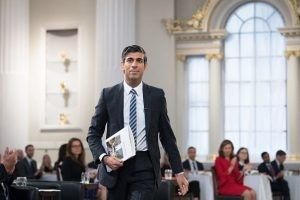BRITISH finance secretary Rishi Sunak underscored his faith in low taxes on Wednesday (23) ahead of an increase in social security contributions in April that will take the government’s tax take to the highest since the 1950s.
“I firmly believe in lower taxes,” Sunak, widely seen as a possible future prime minister, said in excerpts of a speech he is due to deliver on Thursday (24).
“The most powerful case for the dynamic market economy is that it brings economic freedom and prosperity. And the best expression of that freedom is for all of us to be able to make decisions about how to save, invest or use the money we earn.”
The rise of the 41 year-old former Goldman Sachs analyst through the ranks of the Conservative Party, which culminated in his appointment as chancellor of the exchequer two years ago, has made him a leading candidate to replace current prime minister Boris Johnson should he have to resign.

Johnson is embroiled in a scandal over parties held at Downing Street when such gatherings were barred by lockdown rules. Police are investigating.
But Sunak has faced criticism from within his own Conservative Party for sticking to his plan to increase national insurance contributions from April to raise money for health and social care, even as a cost-of-living squeeze tightens.
Just as the higher contributions from workers and employers kick in, regulated domestic fuel tariffs are due to rise by 54 per cent after the surge in energy costs around the world as economies reopen from Covid lockdowns and restrictions.
As well as the social security increase, British companies are facing a sharp jump in the corporation tax rate in 2023 which many say will hurt investment and the kind of push for higher investment and productivity that Sunak is hoping for.
‘PARTY OF HIGH TAX’
The opposition Labour Party’s, Rachel Reeves, said Sunak had raised more tax than any finance minister in half a century and the Conservatives had overseen a decade of slow economic growth.
“It is because the Conservatives are the party of low growth, that they are now the party of high tax,” Reeves said.
In the excerpts of his speech, Sunak stressed the importance of cutting taxes responsibly.
“I am going to deliver a lower-tax economy but I am going to do so in a responsible way, and in a way that tackles our long term challenges,” he said.
Sunak, who ramped up borrowing to levels unseen since World War II to pay for his response to the coronavirus pandemic, also sought to dispel the argument that taxes should be cut even where that would leave spending pressures unfunded.
“I am disheartened when I hear the flippant claim that ‘tax cuts always pay for themselves’. They do not,” he said. “Cutting tax sustainably requires hard work, prioritisation, and the willingness to make difficult and often unpopular arguments elsewhere.”
Sunak is due to deliver the annual Mais Lecture to the Bayes Business School, part of the University of London, which is typically delivered by senior policymakers.
(Reuters)
